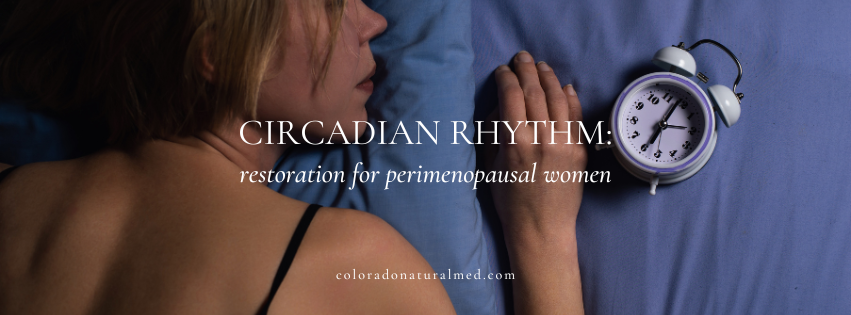
This time of year can signal a change in your circadian rhythm – which is your body’s natural sleep-wake cycle. The circadian rhythm is regulated by a small clock in your brain that responds to light and darkness. It makes sense that with changing seasons, time, and daylight hours, your sleep may be disrupted. If that was all there was to it, it might be an easy adjustment. Because the circadian rhythm controls other bodily functions, including mood, hunger, and hormone levels – when one rhythm is off they can all get out of alignment.
Sleep disruption can cause a myriad of problems that compound each other, especially if you are a woman over the age of 35 you might be going through perimenopause and not even know it. Women in the early stages of menopause may already experience sleep problems and lack of energy due to hormonal changes in the body. Adding on the shift in circadian rhythm because of the season can cause additional stress.
Especially if you are perimenopausal, repairing sleep disruptions is essential, and here’s why: When you sleep, most of your hormones are secreted during that time. If you are not sleeping, then your hormones get out of balance. You need a full recharge at night to make your body work right. If you sleep better, both your mental health, mood, and energy ideally improve, thus giving you the energy to do things during the day and reason to be tired and sleep at night.
There are a number of things you can do on your own to improve sleep, energy, and circadian rhythm, including:
Stick to a regular sleep schedule: Go to bed and wake up at the same time each day, even on weekends. This will help to regulate your circadian rhythm.
Get enough sunlight: Exposure to sunlight helps to regulate your circadian rhythm. Try to get at least 30 minutes of sunlight exposure each day.
Create a relaxing bedtime routine: A relaxing bedtime routine can help you to wind down before bed. This may include taking a warm bath, reading a book, or listening to calming music.
Avoid caffeine and alcohol before bed: Caffeine and alcohol can interfere with sleep. Avoid caffeine in the afternoon and evening, and avoid alcohol within two hours of bedtime.
Create a comfortable sleep environment: Ensure your bedroom is dark, quiet, and cool.
But if your symptoms are not alleviating and you suspect your circadian rhythm is affecting or may be affected by a hormonal imbalance, I can help you determine the underlying cause of your issues and create a plan that will help you find relief. I am a Naturopathic Doctor who helps people with chronic sleep problems, especially perimenopausal women.
In addition to improving your sleep hygiene, there are two things I often suggest to repair circadian rhythm that help my patients fall asleep and stay asleep at night.
- Magnesium glycinate: Magnesium glycinate is a type of magnesium that is well-absorbed by the body. It has been shown to help improve sleep quality. To reserve this supplement, please call CNMA at (303) 688-6698.
- Acupuncture: Acupuncture is a traditional Chinese medicine practice that involves inserting thin needles into specific points on the body. It has been shown to be helpful for various conditions, including insomnia. Schedule an acupuncture appointment here.
If you may be perimenopausal and experiencing sleep problems, lack of energy, or circadian rhythm disruptions, Colorado Natural Medicine & Acupuncture offers a holistic approach to alleviating symptoms. We enable and empower you to restore your energy in a natural way.
Are you ready to start sleeping better? Want to feel more energized? Dr. Adam Graves ND, LAc offers a complimentary 15-minute phone call for new patients where you can ask questions and determine if the naturopathic approach is right for you. Simply call 303-688-6698 or click here to schedule time with Dr. Graves. Together, we can create a plan to help you achieve your health and wellness goals.

Leave a Reply